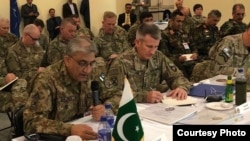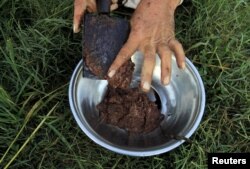Military chiefs from Afghanistan’s neighboring countries, along with U.S. and NATO commanders, met Tuesday in Kabul to discuss cooperation to fight narcotics trading and terrorism.
Afghan Defense Ministry spokesman Dawlat Waziri said the conference intended to find ways to jointly deal with both security challenges.
Officials said delegates at the day-long session decided to continue cooperation for peace and stability in the region.
Pakistan’s army chief, General Qamar Javed Bajwa, also attended the conference. Afghan and American officials accuse his army of harboring Taliban personnel in Pakistan and have been pressuring the neighboring country to take action against them.
“Pakistan has eliminated all terrorist sanctuaries from its soil,” Bajwa’s spokesman quoted him as telling the conference.
But the army chief said Pakistani forces are tracing and targeting “residual signatures of terrorists who take advantage of the presence of 2.7 million Afghan refugees and the absence of effective border security coordination.”
Bajwa reiterated that Pakistani territory can't be used against any other country and Islamabad expected “the same in reciprocity” and called for a “collaborative approach and persistence” to respond to challenges facing the region.
Army chiefs from Afghanistan, Kazakhstan, Kyrgyzstan, Tajikistan, Turkmenistan and Uzbekistan attended the meeting. U.S. CENTCOM chief General Joseph Votel and General John Nicholson, who commands the NATO Resolute Support Mission in Afghanistan, were also in attendance.
Increasing terror attacks
Tuesday’s meeting came amid escalating terrorist attacks in Afghanistan, some claimed by loyalists of Islamic State. It also comes as Afghan poppy production has hit record levels.
U.S. officials estimate income from the illegal narcotics made from poppies funds 65 percent of Taliban-led insurgent activities.
Afghan Defense Ministry spokesman Waziri said his government hopes a joint regional security strategy through conferences like the one Kabul hosted Tuesday would also help counter IS terrorists and address complaints by Iran and Russia that terrorism in Afghanistan threatens their sovereignty and regional security interests.
"Regional countries, including Iran and Russia repeatedly raise alarms that Daesh could spill over their borders and discussions [in Kabul] are exploring ways to fight terrorism and counter narcotics through a common strategy or platform," Waziri noted, using the Arabic acronym for IS.
Moscow and Tehran allege the Middle East-based terrorist group is increasing its footprint in the country with tacit support of the U.S. military.
Washington rejects the allegations as "rumors" and cites sustained air and ground operations U.S. officials say have significantly degraded IS and killed hundreds of its fighters in Afghanistan.
The U.S. military has recently unleashed a new air campaign to destroy Taliban-linked drug labs to disrupt their funding sources. The campaign began in November and has since destroyed dozens of narcotics factories and processing facilities, according to U.S. officials.
Fighting in southern Afghanistan
Meanwhile, Afghan security forces, assisted by NATO air power, repulsed a major Taliban offensive on a southern district center, killing dozens of insurgents.
Officials said Tuesday the overnight multi-prong rebel assault to capture Nesh in Kandahar province could not succeed due to the timely arrival of local and foreign air support.
Provincial police chief General Abdul Raziq told VOA airstrikes inflicted heavy casualties on the assailants before they retreated and fighting died down in the area.
The fighting killed 43 Taliban insurgents and wounded 20 others, he said, but the officer would not say whether Afghan forces also suffered casualties.
Kandahar’s northern Nesh district is located near the boundaries of Zabul and Uruzgan provinces and it had briefly fallen to the Taliban last year. A Taliban spokesman, Qari Yousuf Ahmadi, rejected as baseless propaganda official claims about insurgent casualties. He said the Taliban attack inflicted heavy losses on Afghan forces and captured two government outposts.















